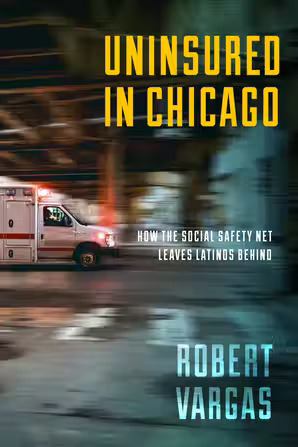
Why do millions of Latinx people don’t access the healthcare system?
University of Chicago professor Robert Vargas’s new book 'Uninsured in Chicago' explores the reasons that keep Latinos feeling locked out of healthcare access.
More than a decade after the passage of the Affordable Care Act, around eleven million Latinx citizens around the country remain uninsured. In 'Uninsured in Chicago: How the Social Safety Net Leaves Latinos Behind' (NYU Press, 2022), University of Chicago sociology professor Robert Vargas explores the roots of this crisis, showing us why, despite their eligibility, Latinx people are the racial group least likely to enroll in health insurance.
Following the lives of forty uninsured Latinx people in Chicago, Vargas provides an up-close look at America’s broken healthcare system, and how it impacts marginalized groups. From excruciatingly long waits and expensive medical bills, to humiliating interactions with health navigators and emergency room staff, he shows us why millions of Latinx people avoid the healthcare system, even in times of need.
“What I learned is that the legacies of people’s experiences with the health care safety net and government more broadly from the past – those legacies mattered tremendously for how people perceived the Affordable Care Act, how they made sense of information coming from the government and then ultimately how they decided whether or not to enroll,” Vargas said to WTTW.
RELATED CONTENT

“For many low-income uninsured in Chicago the first place to go to if you’re in really dire straits for health care is the county emergency room. And I don’t know how many folks make it down to the county emergency room all that often, but the experience is often very hectic. It has very long waits. And then at the end of it of folks are walking away with a very large medical bill. And so that often was a common perception that people when they heard of the ACA, they thought that that’s what it was getting them access to,” he added.
Among the people Vargas interviewed there is Nick, a son of Mexican-American parents, who felt like he was in a “lose-lose situation” as a result of being uninsured and having severe asthma, as reported by WTTW.
“His options were to go to the county emergency room and wait while having these asthma attacks … and he would tell me that he avoided going to the county emergency room out of fear that he was going to die in the waiting room,” said Vargas. “He had another option of going to private university emergency rooms where he could get access to a doctor much faster but then end up with a huge medical bill at the end of it and rack up debt. He had another option of trying to save up money but saving up money for asthma inhalers that cost hundreds of dollars, takes time for folks who aren’t working in high paying sectors of the labor market.”
In the book, Vargas highlights the unique struggles Latinx people face as the largest racial group without health insurance in the United States. An intimate account of the lives of uninsured Latinos, this book imagines new, powerful ways to strengthen our social safety net to better serve our most vulnerable communities.











LEAVE A COMMENT:
Join the discussion! Leave a comment.